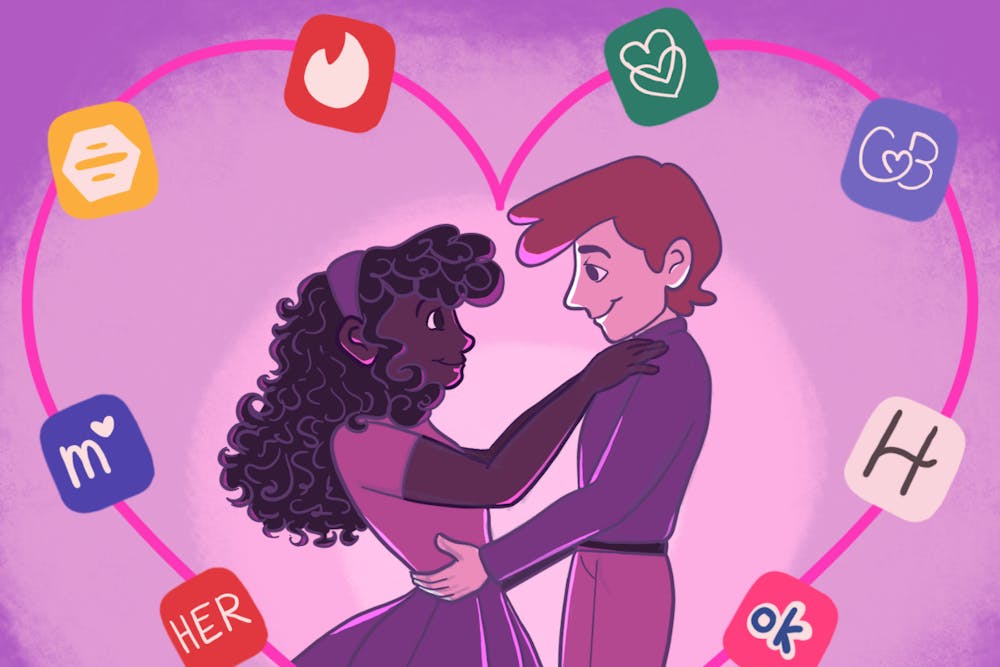With the rise of dating apps, the romantic scene has become a controversial place. For some, apps are an efficient way to meet new people, while others believe these apps are just a digital meat market.
With the practicality of swiping right and left, dating apps have revolutionized modern dating. Around half of adults under 30 have been on dating apps or websites, according to a survey done by the Pew Research Center released in 2023.
Among users of these apps and sites, 53% of people reported having a positive experience and 46% reported a negative one, according to the Pew Research Center.
A common critique of these apps is the concept that they only bring superficial connections. Many argue these apps create an environment that avoids the complexities of in-person interactions. People tend to associate using dating apps as only wanting to find quick hookups.
Aarushi Mishra, a freshman studying business, said she is aware lots of students at ASU use dating apps and believes there is nothing wrong with it.
Yet, Mishra herself has not joined any because of the reputation that is associated with how they are used.
Mishra said people "probably won't find anything serious" on the apps because they are typically looking for a relationship that is quick versus long term.
The survey showed out of smaller shares of participants, 24% people joined to have casual sex and 22% to make new friends.
However, some individuals are proving that these platforms can create real relationships they might never have found otherwise.
One in 10 adults who are married, living with a partner or in a committed relationship met their current significant other through a dating site or app, according to the Pew Research Center.
Savannah Leddy, a senior studying marketing, originally thought of dating apps as "unserious and kind of a joke." Then a friend convinced her to download Hinge for fun.
Leddy was not looking for anything at the time, but that quickly changed when her now-boyfriend messaged her.
Leddy is not embarrassed about meeting her partner through a dating app because she said she believes they are normalized.
"I feel it has become the new norm as it's a great way to meet people that you wouldn't necessarily interact with at your normal spots," Leddy said in a written statement.
According to the same survey done by the Pew Research Center, 44% of dating app users said they joined to meet a long-term partner, while 40% said they joined to date casually.
Interacting through these apps also gives people more confidence to message someone since it is easier to take rejection via text than in person, Leddy said.
READ MORE: Tinder's Campus Crush Dating Guide offers tips, tricks for students
Although Leddy met her match through Hinge, she noted that most apps are seen as a way for people to connect once and then move on to the next rather than making a genuine connection. Ultimately, she said it comes down to the individual and the approach they take.
While Leddy's story highlights how dating apps can bring two people together, others like Wyatt Hussen, a sophomore studying kinesiology, have a more cautious view of these apps.
Hussen decided to join Hinge one day with his friends out of boredom and for the fun of it.
"I didn't go in with any expectations and my impression was that it's not for me," Hussen said.
Hussen was not a fan of online dating; however, he understands why it works for others to meet people or have hookups if that is what they wish to do. But he said at the end of the day, people are talking to strangers, so it's hard to trust them.
Hussen said he believes the stigma that these apps are only used for hookups is a misconception. There are people who use them to find someone to date and to build a long-term connection with.
Of course, no form of dating is without its challenges. Online dating has a unique advantage by reducing the barriers to connection that have historically existed in traditional dating.
But it also presents new challenges like ghosting, misrepresentation, choice overload or the emotional toll of rejection. As the landscape continues evolving, the apps themselves might not be the problem, but rather how society treats and views them.
While it might not be for everyone, the stigma around dating apps is slowly disappearing as more and more couples find love in the digital age.
"I never saw myself as someone who would’ve taken one of those apps seriously, but fast forward in time and I’ve been dating my best friend for a year and a half," Leddy said in a written statement. "You never know what could happen."
Edited by Senna James, Sophia Braccio and Katrina Michalak.
Reach the reporter at nrodri74@asu.edu.
Like The State Press on Facebook and follow @statepress on X.
Natalia is a sophomore studying journalism and mass communication with a minor in creative writing. This is her second semester at The State Press.




